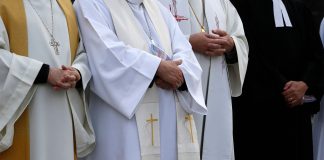How to revive a dying church
Trying to describe a dying church like the one he was called to serve, Pastor Chris Lewis uses the image of a car "turned over, in a ditch, covered by weeds and beer cans, with a rusted out engine, and a couple of bodies in the trunk."
Zechariah: From disbelief to praise
When prayers go unanswered, faith can turn to disbelief and hope to scepticism. On the other hand, God can intervene at unexpected moments, providing unexpected answers, as happened in Zechariah's life.
Miracles or superstition? | An a posteriori response to the anti-supernaturalist assumption
Up until the Enlightenment, the idea that the miracles recorded in the pages of the Bible happened as the biblical writers described them was widely accepted. With the rationalism of the seventeenth and eighteenth centuries, an alternative theory emerged: that miracles were not possible in naturalistic metaphysics.
The forgotten book
Almost 500 years have passed since the 1524 publication of the work that one prominent leader of the 16th-century Protestant Reformation, Andreas Karlstadt, wrote in defence of the Sabbath doctrine.[1] It was the first work on this subject written by a leader of the Reformation.
The Magi of our world
"I love those who love me, and those who seek me find me" (Proverbs 8:17).
How false religious conspiracy theories came to abound
The documentary The Resurrection Tomb is based on James Tabor and Simcha Jacobovici’s book The Jesus Discovery[1] and resumes a controversial topic, also published in 2007, when a similar film was released.
The Dutch Arminians
On the continent jaded by an irrelevant religion, a new denomination appeared, in addition to the Lutheran, Calvinist, and Anglican Protestants—the Arminians.
The Ecumenism Files Part I: From the Apostolic Church to the Great Schism
In the face of the hundreds of Christian confessions that exist today, the ecumenical efforts of the last decades have invariably raised some complementary and equally legitimate questions: Is Jesus' desire "that all of them may be one" (John 17:21) possible?
The Second Coming Files: A 2000-Year Inquiry | Part VI: Waiting for the return of Jesus in 19th century...
The expectation of the soon return of Jesus in 19th century Europe and America has left a path for believers and future believers to tread with confidence. Beyond the imperfect theological understanding of the forefathers, of which no one need be ashamed, God has shown that He can use any material, provided it is consecrated to Him.
Sebastian Castellio
When the Scottish reformer John Knox, Calvin’s disciple, wrote in 1560 in favour of the death penalty for heretics, he was attacking Sebastian Castellio in particular. John Knox did not know then that he was attacking the father of the idea of religious freedom in Christianity.
The courage of freedom
“It was as if I were living in a fairy tale. And the most wonderful part was that I knew—hard as it may be to believe—that the story was true. None of the hardships of imprisonment touched me. The fear of the unknown no longer unsettled me, nor did the fact that, three days after my arrest, no one had yet called me...
How do I know God exists?
You must picture me alone in that room in Magdalen night after night, feeling, whenever my mind lifted even for a second from my work, the steady, unrelenting approach of Him whom I so earnestly desired not to meet. That which I greatly feared had at last come upon me. In the Trinity Term of 1929 I gave in, and admitted that God...
Athanasius | The defender of the New Testament
The New Testament would have looked quite different[1] without the influence of Athanasius the Great, bishop of Alexandria and church father of the Christian Church in the 4th century.
The moral influences of the church on society: four models
The separation between church and state is greeted with enthusiasm by those who appreciate freedom of conscience. However, this separation can also have less fortunate ramifications.
Reasons for reading the Bible
For some, it is an old-fashioned tradition, fanaticism or bizarre practice. For others, a talisman to attract divine favour. Is there anything more to the Bible than an intimidating jumble of genealogies, symbols, and instructions?


























